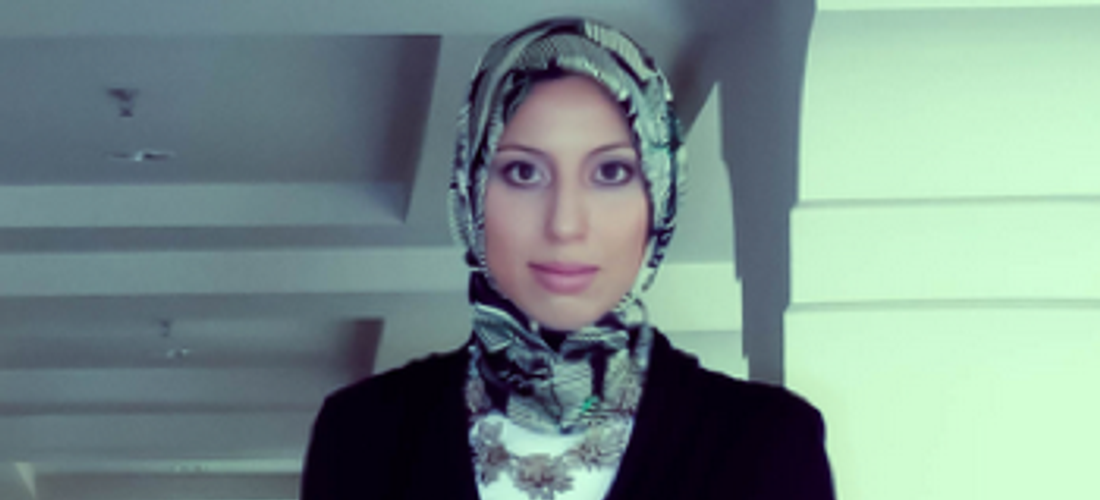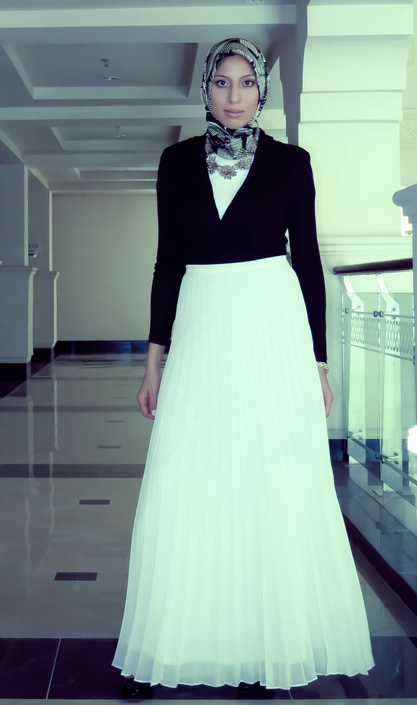Interview with Haute Hijab CEO Melanie Elturk
Melanie's Corner
|
Jul 2, 2012
|
8 MIN READ


oes western fashion inspire you? If so, how do you adapt it to your customer base who are Muslim women?
Western fashion absolutely inspires me. I was born an American and consider myself an American through and through. I am drawn to the fashion of the 40's and 50's. To me, it was the most beautiful time for fashion, because women dressed like women! The clothing coincided with the modesty we are taught to adhere to. As an American, I wear American clothing, and if I'm going to wear the clothing of my culture, I find ways to adapt that clothing to my number one identity, Islam. My customer base is in large part other American Muslim women, so it wasn't hard catering to my main customer base at all. When the mall is filled with short dresses and tight tops, Haute Hijab is like a breath of fresh air.
How old were you when you decided to wear the hijab and why did you wear it?
I was 13 years old, a freshman in high school. My Dad encouraged me to wear it and I definitely couldn't have understood the wisdom and beauty behind hijab as a 13 year old. I'm so glad my Dad encouraged me at such a young age. I don't know if I would've had the strength to put it on at 19 or 20. It wasn't until college that I truly understood the beauty of hijab, how it protected me and raised me in status; how it instantly bonded me to other Muslims, how it deterred others from disrespect and how anytime a person looked at my hijab, they were reminded of God.
What does the hijab mean to you?
Hijab means the world to me. It is the unspoken hand that guides me in the right direction, reminds me of the right things to say and the etiquette and adab of the Prophet (S). It’s an outward expression of what defines me as an individual – Islam. I can only say alhamdulilah for the blessing and guidance of Islam.
Some Westerners believe the hijab is a sign of oppression, what would you say to that?
I would say we need to examine what we mean when we use the word “oppression.” What does it mean to be oppressed? Who is the oppressor? If refusing to wear figure revealing clothing and ounces of make-up on my face to prove that I am beautiful is oppression, then yes, I am “oppressed,” because I refuse to see myself as a sex-object, determining my worth by my outward appearance.
If we’re talking about cruel or unjust exercises of authority, we should examine that as well. Can the hijab be used as a tool of oppression in some places? Certainly. Can this oppression stem from so-called “free” Western countries by not allowing Muslim women to wear hijab to work, or engaging in practices of discrimination toward hijab wearing women? Yes. Can the oppression also come from so-called Muslim countries? Yes. Can we oppress ourselves while we wear hijab? Of course. So I think we have to examine what we really mean when we use the word oppression, but understand that hijab was mandated as a rahma (blessing) from Allah (S). Allah (S) says in the Quran in Surah Al-Ahzab, “O Prophet, tell your wives and your daughters and the women of the believers to draw their cloaks close round them. That will be better, so that they may be recognized and not harassed. Allah is ever Forgiving, Mercifcul.” (33:59). We wear hijab in order to be recognized as women of faith and not to be harassed or disrespected. Therefore, hijab is inherently not oppressive; it is those that choose to use hijab as a tool of oppression that have misunderstood the decree of hijab in Islam.
The hijab represents modesty in Islam. What would you consider being modest?
I don’t know if I entirely agree with the premise that hijab represents modesty in Islam, because it’s a little more complex than that, but certainly modesty has a large place in our deen. The Prophet (S) said, “Every religion has its characteristic and the characteristic of Islam is modesty.” Modesty is not only about covering our hair and body, it’s about having a sense of shame. It’s reflected in our speech and conduct. Looking away when we see sinful acts on TV, feeling shy to talk about things that are lewd or private, being modest in the things we say, the way we carry ourselves; being modest in public in regards to people and in private in regards to God. Modesty begins with the heart, not the hemline. Once you have haya’ in your heart, it will show in your actions and dress.
If hijab represents modesty, do you think it is right to incorporate fashion into it?
This is such a difficult question for me, and one I struggle with everyday. I do not believe that the hijab is or should be a fashion statement. The hijab represents piety and righteousness. It is not meant to be ostentatious or flamboyant. I do believe, however, that as Muslims in America, wearing American clothing, there should be an outlet available to Muslim women, who have a very serious need for appropriate garb and attire. This is what we’re trying to accomplish with Haute Hijab.
Do you think designers as yourselves will encourage the next generation of Muslim women to wear the hijab by providing a array of fashionable choices?
I certainly hope this is not the reason for Muslim women to put on the hijab, as fashion should not draw a woman to wear hijab. Obedience and devotion to Allah should draw us to hijab. I do, however, hope that an array of beautiful prints and colors will get women excited about hijab - make them smile each morning while choosing what hijab to wear, as opposed to feeling like it's a burden or impediment.
Some would argue the hijab is losing its true meaning as women are now wearing it in different styles, shapes and colours. Do you agree? If not, why?
I do agree with this statement to a certain extent. It truly saddens my heart when I see the way hijab is abused. I have no qualms with bold colors and prints, especially in the context of the West, where a colorful hijab does not make one stand out. What I do take issue with is treating the hijab like a fashion statement and not giving it the respect it deserves. This includes showing the neck and ears, allowing hair to be shown in the front, and wearing inappropriate clothing with hijab. I must say that I get extremely nervous when I see hijab looking like the "humps of camels," as the hadith says. Muslim blog, "We love Hijab" has a great post about this topic and I was so relieved to see they wrote a piece on it. I thought I was the only one concerned with this new style! It’s one thing if we’re struggling and wearing it incorrectly knowing that we’re trying to work on ourselves because it’s difficult for us (myself included, first and foremost), but it’s another issue entirely when we knowingly wear it incorrectly and refuse to heed the boundaries laid out for us by Allah (S).
In this Islamphobic society that we now live in, do you think fashion incorporated hijab/abaya’s could be just a means of integration and socialization?
I think this is very dangerous water to tread. If we are trying to strengthen relations with others who have anti-Islamic views by wearing fashionable hijabs and abaya's then we've missed the entire point of Islam. Combating Islamophobia comes through dialogue and education, teaching them the beauty about our religion and highlighting the commonalities between us; not by disingenuously adapting our style of dress to a people who don't really like us that much anyway.
What's in right now? And, how should one incorporate Western fashion with modest attire?
For me, it's never been about what's "in." I've never been one to follow trends, I'm much more concerned about quality pieces that I'll be able to keep for years to come. I'm less inclined to make hijab "fit" in with Western style dress, (wearing leggings under short dresses, wearing long-sleeve shirts under formal gowns, etc.) than I am allowing Western style clothing adapt to modesty and hijab. There are so many beautiful pieces of clothing that are very naturally modest. Just add hijab! For that, I look to an era when women used to dress like women. The 40's and 50's are my two favorite decades when it comes to fashion. Women were inherently modest in their dress, and in my opinion, the most beautiful. Most of the designs from the clothing collection I designed for Haute Hijab were inspired by that era. It's similar to the way I feel about Islam in America in general, let's not try and "fit" Islam into America and strip ourselves of our values and beliefs, rather, let's take from America what coincides with Islam, and add to it.
Do you think there is a market in the western world for designers such as yourself to expand onto the high street?
Yes I definitely think there’s a market for it. At the end of the day, I’m designing modest clothing that is infused with style, class and elegance. Women across the globe Muslim or not can appreciate and are drawn to these types of designs. Of course, the idealist in me will tell you that my ultimate goal is to help create a wave back to the time when women used to dress modestly and there was such a thing called shame when exposing oneself. We’ve started what we call the “modesty movement,” where we’re constantly thinking of ways to create a movement back to modesty by collaborating with women of other faiths who also value modesty and would like to see a shift in the sexualization of women in Western culture.
Finally what advice would you give to someone who is thinking of wearing the hijab?
This is a question I always ask others and have never been asked myself! I would say that if you’re contemplating putting on the hijab – just do it. Don’t hesitate because you never know when that thought will enter your mind again. Put it on and pray that Allah (S) continues to guide you. Even if you haven’t gotten right with the rest of your dress or don’t wear it 100% correctly in the beginning, put it on. It’s better to wear hijab incorrectly than not wear it at all, so long as you’re working towards wearing it correctly to please Allah (S).
Subscribe to be the first to know about new product releases, styling ideas and more.
What products are you interested in?

